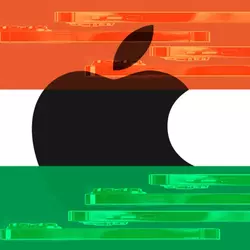
Michael Acton in San Francisco and John Reed in Bengaluru and Chennai
Yesterday
As Donald Trump was preparing to take office for the first time in 2017, Priyank Kharge was busy making calls to Apple’s headquarters in Cupertino, California, from Bengaluru, the city known as India’s Silicon Valley.
With the US president threatening to unleash a wave of tariffs against China, Kharge, the information technology minister of the southern state of Karnataka, seized the opportunity to woo one of the world’s biggest companies. His mission was to convince Apple, whose manufacturing fortunes are prominently tied to China, to set up its first iPhone production plant in India.
The official touted Karnataka’s rich talent pool and sweeteners, such as tax breaks, that Apple could tap if it started making iPhones there. Other states, including Prime Minister Narendra Modi’s home state of Gujarat, were also courting the iPhone maker.
Eight years later, Apple’s Taiwanese supplier Foxconn and India’s Tata Electronics are now, or soon will be, manufacturing iPhones not only in Karnataka but also Tamil Nadu, India’s southernmost state.
Most significantly, Foxconn is producing Apple’s latest smartphone, the iPhone 16 Pro, an indication of how far its relationship with India has developed.
For India, it is an important shift. Mobile phones have now surpassed diamonds as the country’s biggest product export. And although only around 15 per cent of Apple’s iPhones are currently made in India, this is expected to increase to 25 per cent by 2027, according to JPMorgan and Bank of America analysts. Globally, the company shipped some 232mn iPhones in 2024, according to the International Data Corporation.
“If you have an anchor firm like Apple coming in and placing . . . eggs in the India basket, that’s a positive sign,” says Konark Bhandari, a fellow with Carnegie India. “It’s a big signal to other companies that you can do business with some ease here — and also establishes a strong linkage with a downstream manufacturing firm, which wasn’t the case earlier.”
For Apple’s chief executive Tim Cook, the geopolitics surrounding the shift are tricky. Apple — which is intensely secretive about its supply chain — needs to be wary of antagonising China, on which it still overwhelmingly depends.
Complicating matters further is the chilly relationship between Beijing and New Delhi. In a sign of the secrecy and political sensitivities, officials in Karnataka and Tamil Nadu refer to Apple even in private conversations as “the fruit company”.
“It’s very hard to build 35mn fewer phones in China and not be noticed — but they are doing it in the least public way possible,” says Wamsi Mohan, senior equity research analyst with Bank of America.
Nevertheless, Apple’s growing business in India is viewed with suspicion in China. Beijing has recently hampered the movement of some Chinese technicians and capital goods into India, hitting Foxconn and other electronics producers, according to Indian and Chinese officials.
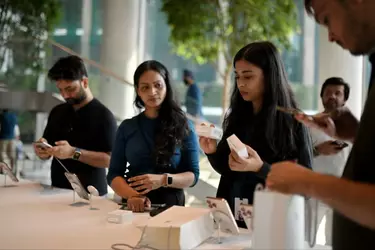
Shoppers at an Apple BKC store in Mumbai. The stakes of Apple’s relationship with India are high for the government, which is under pressure to create sorely needed jobs © Indranil Aditya/Reuters
The return of Trump to the White House, already firing salvos at China with a 10 per cent tariff on imports, underlines why Apple needs to diversify its supply chain and manufacturing, a business strategy known as China Plus One.
The stakes of Apple’s relationship with India are also high for the Modi government, which is under pressure to create sorely needed jobs.
With unemployment hovering at about 10 per cent and millions of young people about to enter the labour force, the clock is ticking. Anger over the issue during last year’s election led to Modi’s Bharatiya Janata party being reduced to a minority for the first time in a decade and forced into a coalition.
But if Apple is to put down deep roots in India, it will need a supply base there to rival its vast network in China.
The iPhones currently made in India are still largely assembled using flown-in parts. To become more ambitious and bolster Apple’s long-term presence, manufacturers of components will have to be lured to the country with similar revenue opportunities as those found in China.
Other aspects of Apple’s success in China, notably a steady supply of mobile and trained female workers, is also proving challenging to replicate in India.
Apple does have keen and powerful partners: Tata, a leading flag-bearer of Indian business, is positioning itself as Apple’s first full-service supplier in India. But the 157-year-old group is a relative newcomer to electronics and will need to evolve quickly to make the partnership a success.
Apple, Foxconn and Tata Electronics declined interview requests. But the Financial Times spoke to current and former executives and employees at the company’s suppliers, Indian government officials, and analysts to piece together Apple’s growing footprint in India.
“Apple will face a few key challenges, including finding suppliers with the expertise it needs and building the flexible workforce it has in China, with the ability to flex up and down by many tens and thousands of workers,” says Chris Miller, the author of Chip War.
“It will also take time for relevant government authorities in India to figure out how Apple works and vice versa — and for both sides to develop the kind of conversations over regulatory issues that Apple has had in China.”
From the moment it launched the iPhone in 2007, Apple bound itself to China.
Henan province alone, the home of Apple’s largest iPhone manufacturing complex, exported around 53mn smartphones in 2024, according to Zhengzhou customs data. That is roughly enough to supply America’s entire annual iPhone demand.
But even before Trump’s return, the lucrative partnership was showing signs of stress. First came the Covid-19 pandemic, which disrupted logistics and put Apple’s supply chain in China under strain as the country maintained its “zero-Covid” policy. In April 2022, Apple warned it could lose up to $8bn in revenue for the quarter as China factories shut down.
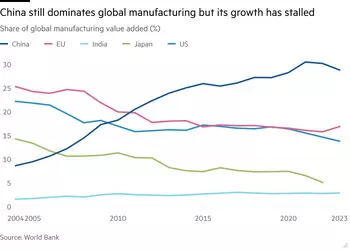
This was a “jolt to the strategy” of China Plus One, says an Indian official. It exposed how reliant Apple had become on China, and how quickly state policies could deal a major blow to its bottom line. That same year, Taiwan’s Pegatron began assembling advanced iPhone models at its Tamil Nadu plant.
The relationship was tested further in 2023 when Beijing cracked down on the use of Apple devices by government employees, hitting Apple’s share price. Sales in China dropped by 11 per cent during the most recent December quarter, partially due to increased competition from Chinese state-subsidised smartphone brands.
Beijing has also placed regulatory roadblocks in front of Apple’s built-in AI system, Apple Intelligence, which aims to compete with those already introduced by China’s Huawei and others. But the company struck a recent deal with Alibaba to supply it with AI features on iPhone, suggesting a path ahead.
“If you look at the policies the government has put in place, Apple obviously gets no favouritism or leniency on regulations,” says Samik Chatterjee, an analyst at JPMorgan.
This contrasts sharply with the warm welcome Apple has received in India. Since 2020, the Modi government has devoted nearly $6bn of the budget for its Production-Linked Incentives (PLI) programme — a broader scheme to lure investment in sectors including renewable power and microchips — to smartphones.
New Delhi has also rolled out the red carpet to Apple’s major suppliers, such as its decision last year to present Young Liu, Foxconn’s chair, with the Padma Bhushan, India’s third-highest civilian honour.
Indian states with established manufacturing centres have been courting Apple for years. Kharge’s overture in 2016-17, later brought Taiwanese supplier Wistron in as the first company to make iPhones, when it launched production of the iPhone SE in Bengaluru.
Around the same time, investment officials in neighbouring Tamil Nadu were making regular visits to Taipei to lure Apple’s Taiwanese suppliers. This paid off in 2019 when Foxconn began assembling iPhones at its plant in Sriperumbudur, a town in Tamil Nadu, which had been used for Chinese smartphones, such as Xiaomi and Oppo.
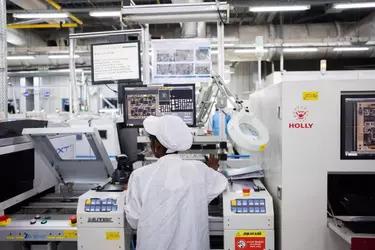
Foxconn is preparing for mass production of Apple’s latest smartphone, the iPhone 16 Pro, an indication of how far its relationship with India has developed © Karen Dias/Bloomberg
In 2020, Tata entered the field by making housings, or the backs of phones, at a factory in Hosur, Tamil Nadu, near the Karnataka border. In the run-up to Apple opening its first two Indian stores in Delhi and Mumbai in 2023, Tata emerged as a key local partner. Tata’s Croma retail brand is the main reseller of Apple products, a relationship that the conglomerate is now leveraging in its push to become an end-to-end iPhone contractor.
More recently, Tata has bought Wistron’s Bengaluru plant and Pegatron’s facility in Tamil Nadu, where it secured a 60 per cent controlling stake for an undisclosed amount last month.
But Tata’s ambitions extend to semiconductors, and the Indian conglomerate is building an $11bn chip “fab” in the western state of Gujarat, a joint venture with Taiwan’s Powerchip Semiconductor Manufacturing Corporation, as well as a chip manufacturing and packaging facility in Assam, a state in the north-east.
Some of Tata’s chips may be destined for iPhones in future, according to industry participants and analysts. “Tata Electronics hopes to get the bulk of [Apple’s] business in India — not only in terms of phones, but other electronics,” says an Indian official with direct knowledge of the matter, who like others, asked not to be named.
“Tata is trying to get as much skin in the game as possible with Apple,” says Neil Shah, a Mumbai-based analyst and co-founder of Counterpoint Research. “There is a trust factor with Tata and in India overall.”
And with Tata now “going full throttle”, Shah predicts India’s contribution to global iPhone output, which he says has been growing 27 per cent annually, will cross the 20 per cent contribution milestone this year.
But regardless of the progress made so far, India’s dream of getting more business from Apple still faces obstacles.
Much of what Indians call iPhone production is still largely a screwdriver operation, involving the assembly of imported parts. Indian officials know that luring more suppliers is critical to Apple’s future in the country.
Some suppliers are starting to make the shift. Last year, US smartphone glassmaker Corning partnered with India’s Optiemus Infracom to build manufacturing facility Bharat Innovative Glass Technologies, known as BIG Tech, in Tamil Nadu, set to come online in the second half of this year. While Corning did not mention its future customers, officials in India tell the FT it will be supplying Apple.
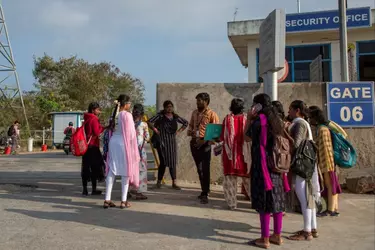
In 2019, Foxconn began assembling iPhones at its plant in Sriperumbudur, a town in Tamil Nadu, which had been used for Chinese smartphones, such as Xiaomi and Oppo © Palani Kumar/Reuters
US manufacturer Jabil, another Apple supplier, in September announced an MOU with Tamil Nadu for an expansion of its facility in Tiruchirappalli. Finnish company Salcomp, which produces chargers, displays and other smartphone components for Apple, also has a base in Tamil Nadu.
A plant in Hyderabad set up by Foxconn Interconnect Technology, a unit of the Taiwanese group, will soon start making AirPod earphones in India for the first time, according to industry officials.
Yet the process of moving from China to India remains “difficult and expensive”, says a manager at a China-based Apple supply chain partner. The political tension between the two Asian giants makes the shift even more complex.
“China is in a tough spot: everybody keeps talking about companies moving supply chains away from there,” says Mary Lovely, a China trade expert at the Peterson Institute. “But they have weak domestic demand and an employment problem, so seeing the equipment being rolled offshore is not something they are going to see as a positive development.”
After deadly border clashes between Indian and Chinese troops in 2020, New Delhi responded by banning TikTok and dozens of other Chinese apps as well as imposing draconian restrictions on Chinese foreign direct investment.
Then the Indian authorities made it a requirement for foreign companies from bordering countries to get approval from a government committee before proceeding with any investment.
Though the edict did not name China, EV maker BYD and Apple supplier Luxshare are among the Chinese companies that failed to secure India’s blessing to build plants, government officials told the FT last year.
Indian restrictions on granting visas to Chinese citizens also slowed some of Foxconn’s and Apple’s progress last year, industry officials acknowledge.
But such measures hurt India’s ambitions too. Many of the specialised machines used in iPhone assembly plants are programmed in Mandarin, for example, requiring Chinese or Taiwanese employees to be flown in to set them up or fix them if they break. Last year, a visa backlog for Chinese citizens prevented engineers from entering India, which affected Apple and some of its suppliers.
In response, Indian business lobbies pressed the government to relent, and officials tell the FT that visas for Chinese citizens are now more readily available — at least for industries the Modi government is targeting with its PLI schemes.
China is in a tough spot: everybody keeps talking about companies moving supply chains away from there
Another barrier for India in building a successful supply chain is access to reliable labour. Women form the backbone of Apple’s manufacturing and assembly operations in China and other Asian markets such as Vietnam. In India, officials say there is a challenge to overcome societal pressures that prevent women from working and to create safe conditions as the country grapples with a rise in gender-based violence.
Tamil Nadu is promoting itself as the best place to employ women in India. The state already has high female education and employment, and thanks to policies such as dedicated bus transport schemes to support safer commuting, it accounts for around 42 per cent of all factory jobs held by women in India.
The state, as well as Foxconn and Tata, is also investing in hostels in Tamil Nadu’s two main industrial clusters serving Apple. This is seen as an essential piece of the puzzle for employing qualified women in numbers.
Privately, Indian officials acknowledge how much work they need to do to build a viable supply base with enough scale to support manufacturing of components when the market is still small.
The iPhone 15 was India’s top-selling smartphone model in the December quarter, and Apple now claims a 23 per cent share of the market’s revenue, ahead of rival Samsung’s 22 per cent, according to Counterpoint Research. Yet India remains a relatively small consumer market for Apple, selling less than a quarter of the number of iPhones it sold in China last year, according to independent estimates.
When asked about Apple’s plans for India on the company’s most recent earnings call, Cook simply noted that the business needed certain “economies of scale” to manufacture for both domestic and export markets.
But he added that the Indian smartphone market showed “a lot of upside”.
On the ground, the signs of how far India has come are clear. Bank of America’s Mohan points specifically to the manufacturing of the iPhone 16 Pro: “The fact that India is now making Apple’s most advanced iPhone model is testament to the fact that they have been able to ramp successfully.”
Additional reporting by Ryan McMorrow and Wenjie Ding in Beijing
Source (Archive)

